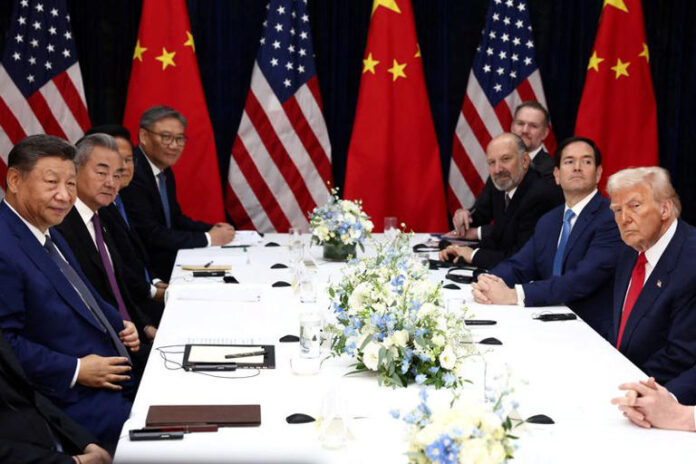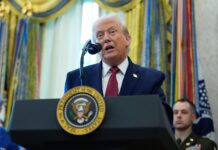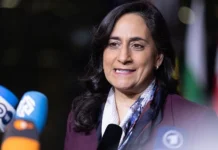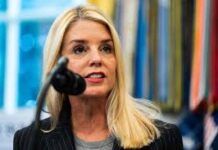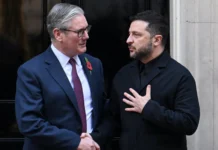(Reuters) – U.S. President Donald Trump said on Thursday he had agreed with President Xi Jinping to trim tariffs on China in exchange for Beijing cracking down on the illicit fentanyl trade, resuming U.S. soybean purchases and keeping rare earths exports flowing.
Trump’s face-to-face talks with Xi in the South Korean city of Busan, their first since 2019, marked the finale of a whirlwind Asia trip on which he also touted trade breakthroughs with South Korea, Japan and Southeast Asian nations. The deal, according to Beijing, also included a U.S. pledge to delay for a year a new measure — strongly opposed by China — to bar thousands of Chinese firms from receiving U.S. technology if they are part-owned by a sanctioned company.
“It was an amazing meeting,” Trump told reporters aboard Air Force One shortly after he left South Korea, ranking the talks a “12 out of 10”.
Trump said tariffs on Chinese imports would be cut to 47% from 57%, by halving to 10% the rate of tariffs related to trade in fentanyl precursor drugs.
Xi will work “very hard to stop the flow” of fentanyl, a deadly synthetic opioid that is the leading cause of American overdose deaths, Trump said.
China agreed to pause export controls unveiled this month on rare earths, elements with vital roles in cars, planes and weapons that have become Beijing’s most potent source of leverage in its trade war with the United States.
The pause would last for a year, China’s commerce ministry said in a statement.
China agreed to buy 12 million metric tons of U.S. soybeans through January, and to purchase 25 million tons annually for the next three years, U.S. Treasury Secretary Scott Bessent told Fox Business Channel’s “Mornings with Maria” program.
He said China had approved an agreement to bring short video app TikTok under U.S.-controlled ownership, and he expected it to move forward in coming months.
China also agreed to purchase oil and gas from the U.S., Trump said in a Truth Social post. Bessent later said Xi also unilaterally expressed interest in participating in a new U.S. pipeline being built in Alaska, but gave no details.
Washington, meanwhile, will suspend for one year new Entity List restrictions that make it harder for Chinese firms to use affiliates to buy off-limits technology, as well as suspending measures targeting China’s maritime logistics and shipbuilding sector, Bessent said.
Trade experts said the agreement offered a one-year reprieve from tensions that have weighed on global growth, but cautioned that China had failed to meet its purchase agreements under the Phase 1 trade deal signed during Trump’s first term, and geopolitical tensions could reignite the trade war at any time.
“The tariff cut in exchange for a promised fentanyl crackdown buys temporary calm, but it’s transactional relief —not a structural reset,” said Craig Singleton, senior China fellow at the non-partisan Foundation for Defense of Democracies.
“Each side is calibrating tension to avoid collapse while keeping escalation on the table. Nothing fundamental changed, and the cycle of coercion will resume the moment one side feels shortchanged,” he said.
MUTED RESPONSE FROM GLOBAL MARKETS
Trump’s meeting with Xi followed a summit with South Korean President Lee Jae Myung, where the two allies said they had finalised most details on a tariff deal they had been wrangling over for months.
The reaction to the detente was muted in global stock markets that had hit records ahead of the meeting on hopes of a breakthrough in a trade war between the world’s two largest economies that has disrupted supply chains and rocked global business confidence.
Trump repeatedly talked up prospects of reaching agreement with Xi since U.S. negotiators on Sunday said they had agreed a framework with China to avoid 100% U.S. tariffs on its goods and defer China’s export curbs on rare earths.
U.S. Senate Democratic Leader Chuck Schumer, in a post on X Thursday, said Trump’s statements on the summit should not be believed. “Trump folded on China,” he wrote.
The cordial meeting between the leaders, at a South Korean air base on the sidelines of the Asia-Pacific Economic Cooperation (APEC) forum, lasted more than 1-1/2 hours.
FRICTIONS NOW AND THEN ARE NORMAL
It was normal for the two sides to have frictions now and then, Xi told Trump via a translator, as they faced each other, flanked by their delegations.
“China’s development and rejuvenation are not incompatible with President Trump’s goal of ‘Making America Great Again,'” Xi added.
They also agreed to pause tit-for-tat port fees on shipping, designed to thwart dominance in shipbuilding, ocean freight and logistics.
China will begin the process of purchasing U.S. energy, Trump said in a post on Truth Social on Thursday, hinting at a big deal in Alaska where his administration has been touting a proposed $44-billion LNG export project.
Trump said he would travel to China in April before he receives Xi in the United States.
Chinese state media portrayed the meeting as a triumph of Xi’s policymaking. “We have the confidence and capability to navigate all kinds of risks and challenges,” the official news agency, Xinhua, quoted him as saying.
NO NVIDIA CHIP, TAIWAN DISCUSSIONS
The agreement broadly returns ties to their status before Trump’s “Liberation Day” offensive in April triggered tit-for-tat escalation and leaves only Brazil and India facing higher tariffs among major U.S. trading partners.
But it may be no more than a fragile truce in a trade war with root causes still unresolved, analysts say.
Trump said he did not discuss Nvidia’s (NVDA.O), opens new tab state-of-the-art Blackwell chip with Xi, in a further blow to the firm’s hopes of maintaining its presence in China’s $50-billion AI market.
The contentious issue of Taiwan, the democratic island claimed by China that is a U.S. partner and high-tech powerhouse, also did not surface in the talks, Trump said.
Minutes before starting the meeting, Trump ordered the U.S. military to resume testing nuclear weapons after a gap of 33 years, pointing to the growing arsenals of Russia and China.
China’s foreign ministry said on Thursday it hoped the U.S. would stick to a moratorium on nuclear testing.









